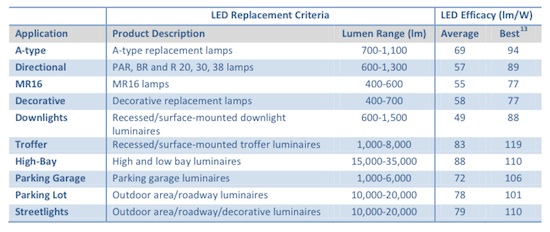The U.S. Department of Energy (DOE) has come out a report "Adoption of Light-Emitting Diodes in Common Lighting Applications," providing estimates of current energy savings, as well as potential savings if these markets switched to LEDs overnight.
Nine markets were analyzed:
--Four indoor lamp applications (A-type, directional, MR-16, and decorative)
--Three indoor luminaire applications (downlight, troffer, and high-bay)
--Two outdoor luminaire applications (streetlight and parking lot/garage).
In 2012, about 49 million LED lamps and luminaires were installed in the nine applications. LEDs in these markets saved approximately 71 trillion British thermal units (tBtu), equivalent to an annual energy cost savings of about $675 million -- an amount that far exceeds the total DOE Solid-State Lighting Program investment of $270 million.
In addition, if these nine markets switched to LEDs overnight, annual source energy savings could approach 3,873 tBtu, or about 3.9 quadrillion Btu (quads), saving nearly $37 billion in annual energy costs. This amount represents approximately half of the total national lighting energy consumption in 2012.
The report notes that "the energy consumption and savings estimate results are highly sensitive to the state of LED
technology"; accordingly, it considered the best available existing LED technologies (see table below), rather than trying to do any projections based on upcoming but not yet available technologies.

Figure ES.1 from the report: Comparison of current and potential source energy savings (Credit: U.S. DOE)

(Table 1.2 from the report: Average and most efficacious LED products from DOE’s LED lighting facts database; LED efficacy values based on Lighting Facts database query from March 2013 -- Credit, U.S. DOE)













